
Electrochemical Consumables
Thin-Layer Spectral Electrolysis Electrochemical Cell
Item Number : ELCST
Price varies based on specs and customizations
$569.90 / set
- Specifications
- water system / non-water system
- Sealing form
- non-sealed
- Material
- Quartz + PTFE
Shipping:
Contact us to get shipping details Enjoy On-time Dispatch Guarantee.
Why Choose Us
Easy ordering process, quality products, and dedicated support for your business success.
Introduction
The thin-layer spectral electrolysis cell boasts corrosion resistance and complete specifications, while also featuring good sealing and high-quality material selection. Additionally, it is both safe and durable, making it an excellent choice for a range of applications. Furthermore, the cell can be easily customized to meet specific needs and requirements.
Detail & Parts
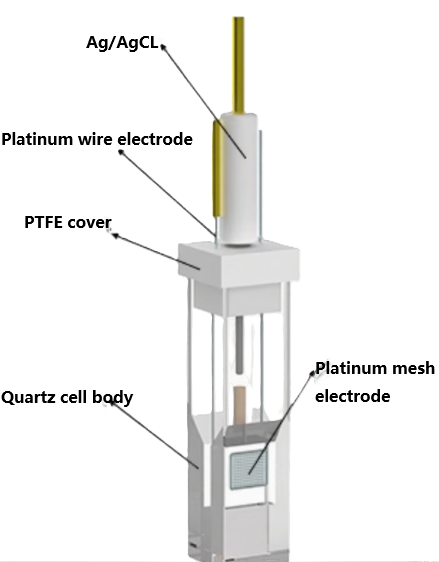
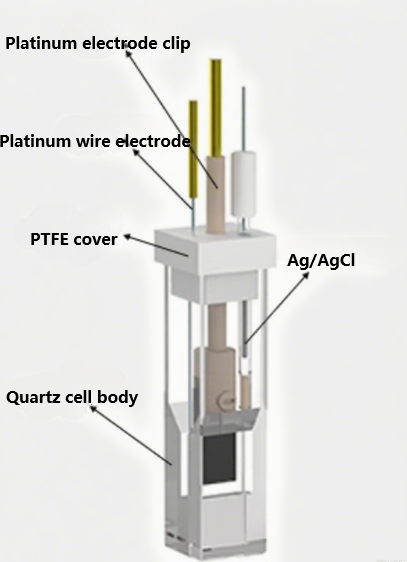
K003 Spectroscopic Electrochemical Cell
| Parameter | Details |
|---|---|
| Volume | 200μL |
| Material | All-quartz |
| Slit Size | 2mm (width) × 10mm (depth) |
| External Size | 12 × 12 × 45mm (L×W×H) |
| Internal Size | 10 × 10mm (L×W) |
Model Comparison
| Component | K003-01 (Platinum Mesh) | K003-02 (Electrode Clip) |
|---|---|---|
| Electrode 1 | Platinum mesh | Platinum clip |
| Electrode 2 | Platinum wire | Platinum wire |
| Electrode 3 | Standard Ag/AgCl | Mini Ag/AgCl |
| Included Parts | Quartz cell + PTFE lid + 3 electrodes | Quartz cell + PTFE lid + 3 electrodes |
Designed for You
KinTek provide deep custom made service and equipment to worldwide customers, our specialized teamwork and rich experienced engineers are capable to undertake the custom tailoring hardware and software equipment requirements, and help our customer to build up the exclusive and personalized equipment and solution!
Would you please drop your ideas to us, our engineers are ready for you now!
Trusted by Industry Leaders

FAQ
What Are Electrolytic Cells Used For?
What Is The Difference Between Galvanic Cell And Electrolytic Cell?
What Is An Electrolytic Cell And How Does It Work?
What Are The Two Points Of Difference Between Electrochemical And Electrolytic Cells?
What Is The Example Of Electrolytic Cell?
Are Electrolytic Cells Spontaneous?
4.8 / 5
This thin-layer spectral electrolysis cell is a lifesaver! It's incredibly easy to use, and the results are fantastic. I highly recommend it for anyone looking for an efficient and reliable electrolysis cell.
4.7 / 5
I'm blown away by the quality of this thin-layer spectral electrolysis cell. It's made with top-notch materials and construction, and it performs flawlessly. Definitely worth the investment!
4.9 / 5
I've been using this thin-layer spectral electrolysis cell for a few weeks now, and I'm incredibly impressed. It's durable, reliable, and delivers consistent results every time. Highly recommended!
4.6 / 5
This thin-layer spectral electrolysis cell is a game-changer. It's so easy to use, and the results are amazing. I've never seen anything like it before. If you're looking for a top-of-the-line electrolysis cell, this is the one.
4.8 / 5
I'm a lab manager, and I've used many electrolysis cells over the years. This thin-layer spectral electrolysis cell is by far the best I've ever used. It's incredibly precise and accurate, and it produces consistent results every time. I highly recommend it to anyone who needs a reliable and high-quality electrolysis cell.
4.7 / 5
This thin-layer spectral electrolysis cell is a must-have for any lab. It's incredibly user-friendly, and it produces amazing results. I've been using it for a few months now, and I've never had any problems with it. Highly recommended!
4.9 / 5
I'm so glad I purchased this thin-layer spectral electrolysis cell. It's made my work so much easier. It's incredibly efficient and accurate, and it produces consistent results every time. I highly recommend it to anyone who needs a reliable and high-quality electrolysis cell.
4.6 / 5
This thin-layer spectral electrolysis cell is a great value for the money. It's made with high-quality materials and construction, and it performs flawlessly. I've been using it for a few weeks now, and I'm very impressed with its durability and reliability. Highly recommended!
4.8 / 5
I'm a big fan of this thin-layer spectral electrolysis cell. It's so easy to use, and it produces amazing results. I've never seen anything like it before. If you're looking for a top-of-the-line electrolysis cell, this is the one.
4.7 / 5
This thin-layer spectral electrolysis cell is a great addition to my lab. It's incredibly precise and accurate, and it produces consistent results every time. I highly recommend it to anyone who needs a reliable and high-quality electrolysis cell.
REQUEST A QUOTE
Our professional team will reply to you within one business day. Please feel free to contact us!
Related Products

Quartz Electrolytic Electrochemical Cell for Electrochemical Experiments
Looking for a reliable quartz electrochemical cell? Our product boasts excellent corrosion resistance and complete specifications. With high-quality materials and good sealing, it's both safe and durable. Customize to meet your needs.
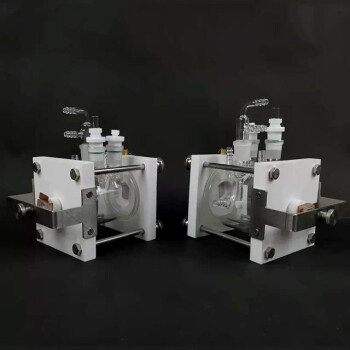
Flat Corrosion Electrolytic Electrochemical Cell
Discover our flat corrosion electrolytic cell for electrochemical experiments. With exceptional corrosion resistance and complete specifications, our cell guarantees optimal performance. Our high-quality materials and good sealing ensure a safe and durable product, and customization options are available.

Electrolytic Electrochemical Cell for Coating Evaluation
Looking for corrosion-resistant coating evaluation electrolytic cells for electrochemical experiments? Our cells boast complete specifications, good sealing, high-quality materials, safety, and durability. Plus, they're easily customizable to meet your needs.
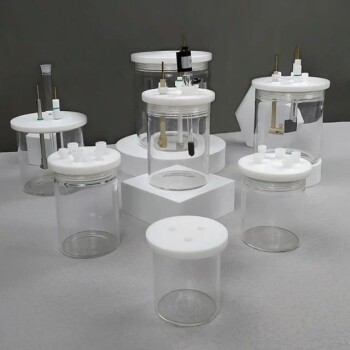
Electrolytic Electrochemical Cell with Five-Port
Streamline your laboratory consumables with Kintek's Electrolytic Cell with five-port design. Choose from sealed and non-sealed options with customizable electrodes. Order now.

Electrolytic Electrochemical Cell Gas Diffusion Liquid Flow Reaction Cell
Looking for a high-quality gas diffusion electrolysis cell? Our liquid flow reaction cell boasts exceptional corrosion resistance and complete specifications, with customizable options available to suit your needs. Contact us today!

Optical Water Bath Electrolytic Electrochemical Cell
Upgrade your electrolytic experiments with our Optical Water Bath. With controllable temperature and excellent corrosion resistance, it's customizable for your specific needs. Discover our complete specifications today.
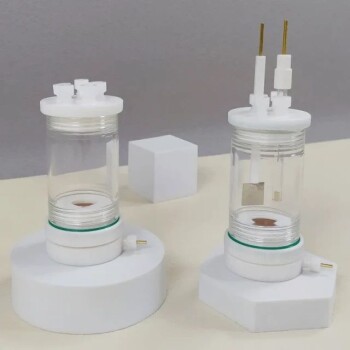
Multifunctional Electrolytic Electrochemical Cell Water Bath Single Layer Double Layer
Discover our high-quality Multifunctional Electrolytic Cell Water Baths. Choose from single or double-layer options with superior corrosion resistance. Available in 30ml to 1000ml sizes.

H-Type Double-Layer Optical Electrolytic Electrochemical Cell with Water Bath
Double-layer H-type optical water bath electrolytic cells, with excellent corrosion resistance and a wide range of specifications available. Customization options are also available.

Lab Electrochemical Workstation Potentiostat for Laboratory Use
Electrochemical workstations, also known as laboratory electrochemical analyzers, are sophisticated instruments designed for precise monitoring and control in various scientific and industrial processes.

RRDE rotating disk (ring disk) electrode / compatible with PINE, Japanese ALS, Swiss Metrohm glassy carbon platinum
Elevate your electrochemical research with our Rotating Disk and Ring Electrodes. Corrosion resistant and customizable to your specific needs, with complete specifications.
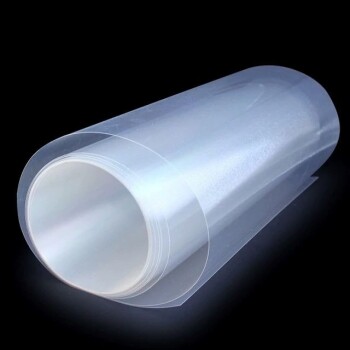
Proton Exchange Membrane for Batteries Lab Applications
Thin proton exchange membrane with low resistivity; high proton conductivity; low hydrogen permeation current density; long life; suitable for electrolyte separators in hydrogen fuel cells and electrochemical sensors.
Related Articles

Understanding Flat Corrosion Electrolytic Cells: Applications, Mechanisms, and Prevention Techniques
Explore the detailed workings of flat corrosion electrolytic cells, their role in industrial processes, and effective strategies to mitigate corrosion. Learn about electrolytic cells, their components, and applications in electroplating and metal purification.

Advanced Electrolytic Cell Techniques for Cutting-Edge Lab Research
Electrolytic cells are devices that utilize an electric current to induce a non-spontaneous chemical reaction.

Applications of Electrolytic Cells in Purification and Electroplating
Electrolytic cells are chemical cells that use electricity to generate a non-spontaneous redox reaction. These cells are used in various electrochemical processes such as electrolysis and electroplating.

Applications of H-Type Electrolytic Cell in Metal Extraction
H-type electrolytic cells uses an electrolyte solution to dissolve the metal ions and an electric current to separate the metal ions from the solution.

Innovations in Electrochemical Electrodes Technology
Recent advancements in nanotechnology and materials science have led to significant improvements in electrochemical devices, making them more efficient, durable, and cost-effective.

Understanding Electrodes and Electrochemical Cells
An electrode is a point where current enters and leaves the electrolyte. It is a conductor used to make a junction with a nonmetallic part of a circuit. Electrodes can be made of materials such as gold, platinum, carbon, graphite, or metal. They serve as the surface for oxidation-reduction reactions in electrochemical cells. There are different types of electrodes, including anode and cathode.

Understanding Quartz Electrolytic Cells: Applications, Mechanisms, and Advantages
Explore the detailed workings, applications, and benefits of quartz electrolytic cells in various industries. Learn how these cells facilitate precise chemical reactions and their role in high-purity metal production.

Overcoming Challenges with H-Type Electrolytic Cell Operation
Understanding the components and operation of the H-type electrolytic cell is crucial in producing high-quality chemicals and overcoming the challenges that come with its operation.

The Future of Electrochemical Electrodes
The latest trends and developments in electrode materials and their implications for the future of electrochemistry.

Understanding Electrolytic Cells: Conversion of Energy and Applications
Electrochemical cell An electrochemical cell is a device capable of either generating electrical energy from chemical reactions or facilitating chemical reactions through the introduction of electrical energy.

How to Choose the Right Electrochemical Electrode
The choice of electrode material can have a significant impact on the performance of the electrochemical system.

Electrochemistry The Science Behind Electrochemical Cells
Electrochemistry is important because it helps us understand the behavior of materials and substances in different environments.